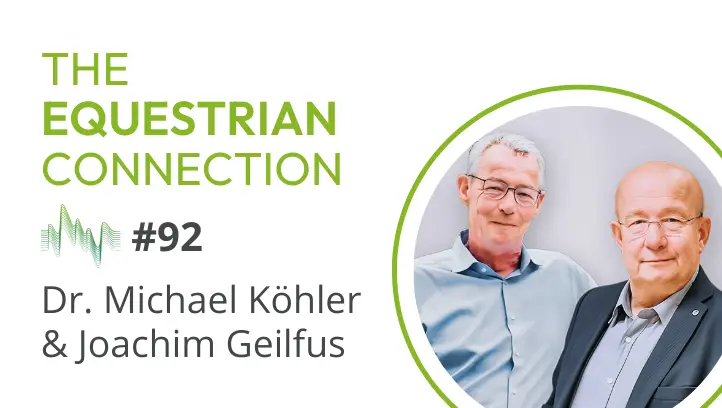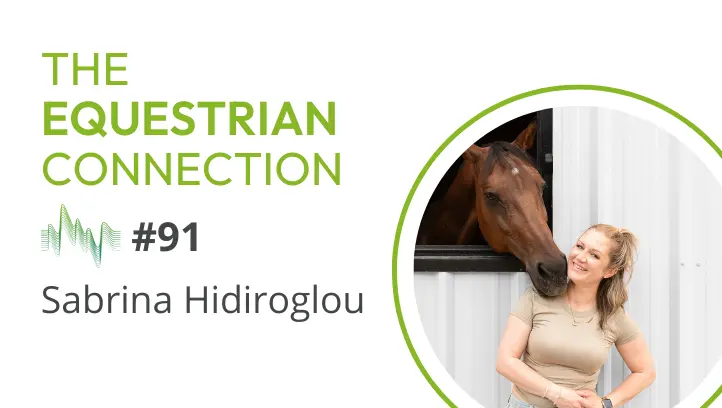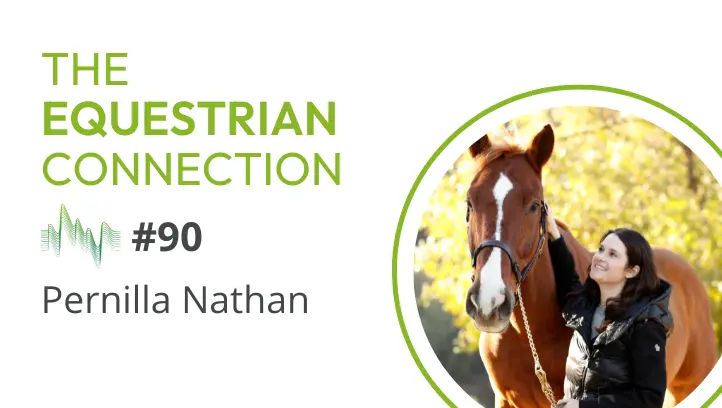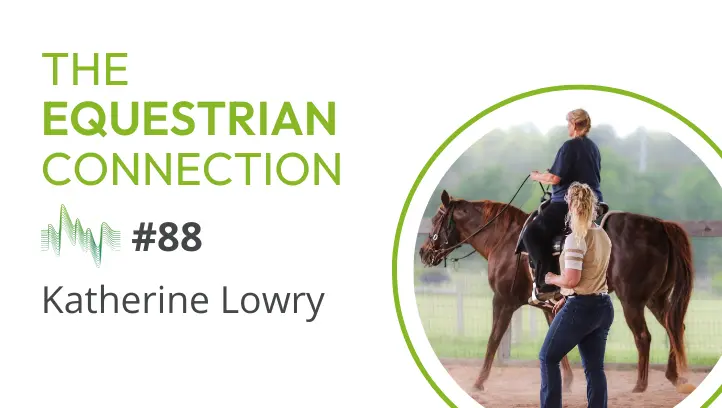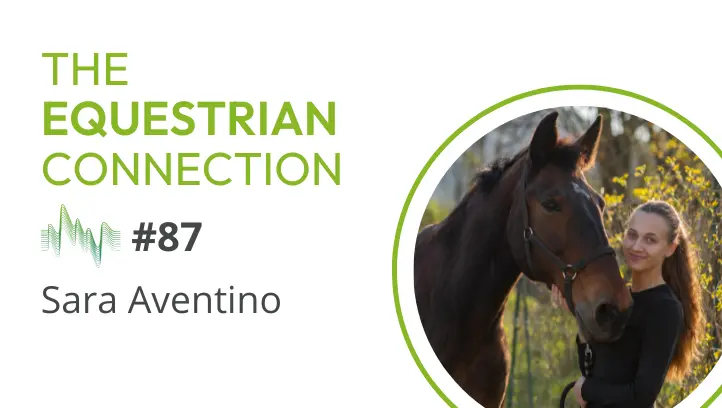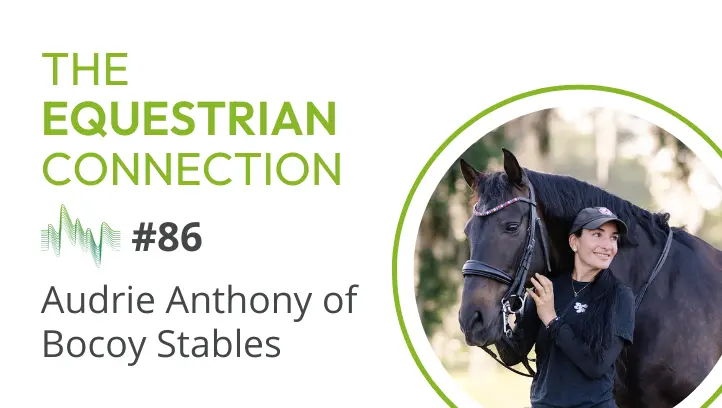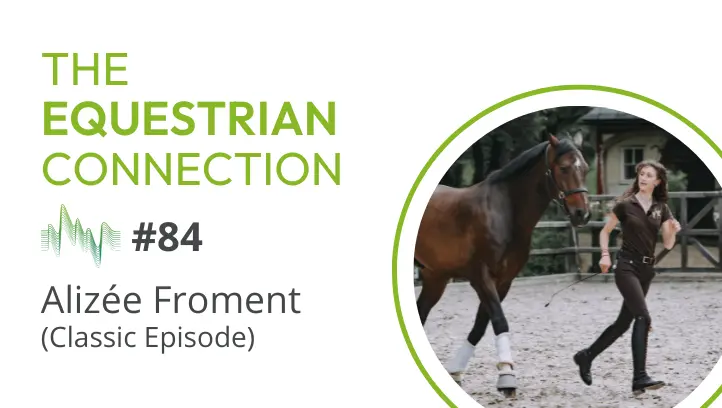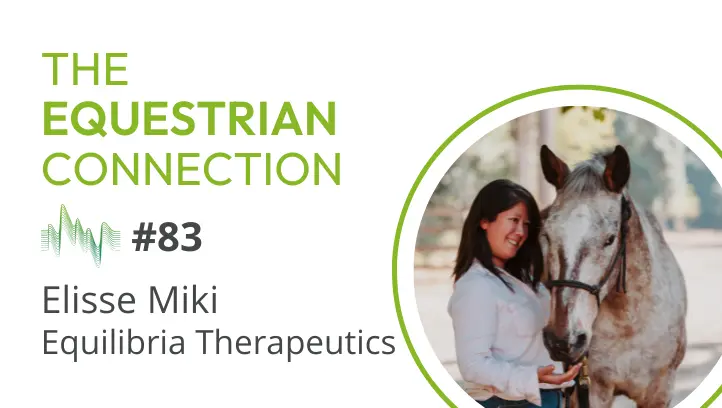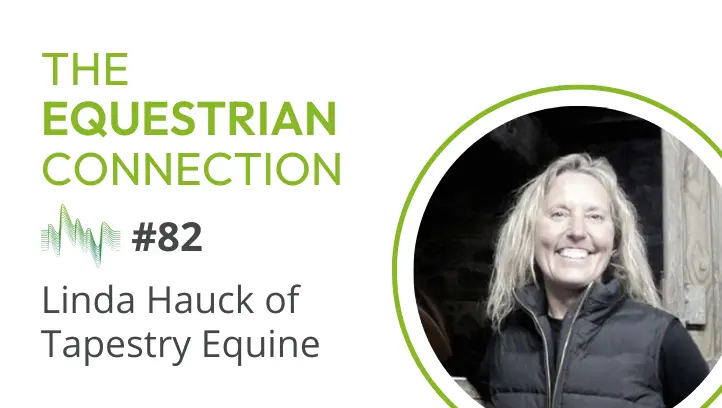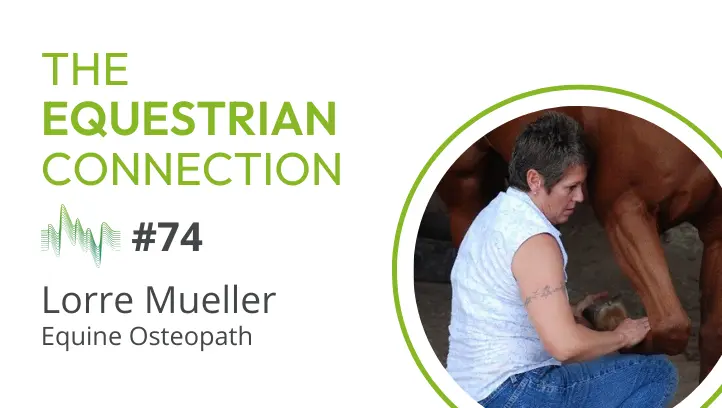#32 The Key to Harmony and Bonding with Your Horse with Linda Tellington-Jones
Linda Tellington-Jones is a true icon in the horse world. With her innovative method, the Tellington TTouch method, she has helped countless horse owners to establish a deeper connection with their beloved four-legged friends.
In this episode, Linda shares her unique insights and experiences of how the Tellington TTouch Method can successfully enhance the connection between humans and animals. She shares how these gentle touches and movements can help build trust, relaxation, and harmony between horse and rider.
Podcast Transcript
This transcript was created by an AI and has not been proofread.
This transcript was created by AI and has not been proofread
[SPEAKER 3]On this week’s episode, Linda Tellington-Jones, founder of the Tellington T-Touch Method.
[SPEAKER 1]It’s like a feeling. I call it a heart-to-heart and cell-to-cell because that’s where this one and a quarter t-touches come in that you just do on the surface of the body. It’s not anything about working the muscles. It’s nothing like massage.
[SPEAKER 3]Welcome to the Equestrian Connection podcast from wehorse. My name’s Danielle Crowell, and I’m usually your host, but we have a special episode for you this week with wehorse CEO, Christian Kroeber, and the one and only Linda Tellington-Jones. Linda Tellington-Jones is a true icon in the horse world. With her innovative method, the Tellington T-Touch method, she has helped countless horse owners to establish a deeper connection with their beloved four-legged friends. Christian had a chance to sit down in person with Linda at her home in Florida for this impactful conversation, and we just knew we had to record it for our podcast. In this episode, Linda shares her unique insights and experiences of how the Tellington T-Touch method can successfully enhance the connection between humans and animals. She shares how these gentle touches and movements can help build trust, relaxation, and harmony between horse and rider. Let’s dive in.
[SPEAKER 2]Hi, Linda.
[SPEAKER 1]Hi Christian.
[SPEAKER 2]Great to have you back on our podcast.
[SPEAKER 1]I always love being on your podcast with you.
[SPEAKER 2]We spent a lot of time together the past days here in Florida. Yes. You turned 85 last year. I did. And we talked a lot about the coming years for you. You always claim to have a five or sometimes even 15 year or 20 year plan. And you talked a lot about the connectedness between human and animal.
[SPEAKER 1]Correct.
[SPEAKER 2]From your vantage point, what is the connectedness?
[SPEAKER 1]The connectedness is when we be with our animals on the same level that we treat them as though they have the same, which they do, the same feelings that we have, that they feel when we are coming from a place of appreciation and gratitude and actually seeing the individuality of that horse. from a place of, how can I say it? I mean, when an animal, horse, dog, doesn’t matter what the animal is, does something that we don’t approve of, usually the human thing is well corrected. And the fact is, if we begin to find ways, which is what I’ve done over these years, of finding ways Showing an animal what? We need first of all to be safe in the case of horses, which is really important really really important and Then finding how can that how can I be with that animal in a way that they enjoy? Being with me as much as I am with them. I mean, let’s talk about horses, you know You can come to a horse from a place of well, I can do my sport on the horse which you know lot of people do but the people who come I think to we horse I Think there’s more and more people who want a special connection and this is what we get in the dog world We have so many trainers to come to us from all parts of the world Asia also just as much as here and want a special connection. They want to be seen and that’s I This is what I feel.
[SPEAKER 2]I don’t know if you remember, but at Equitana, when we had that party for me, it was my… Yeah, it was a couple of years ago at Equitana, the World Equestrian Fair in Germany.
[SPEAKER 1]Right, and you asked me, okay, it was a party for my 40th year at Equitano?
[SPEAKER 2]For your anniversary at the Expo.
[SPEAKER 1]Right, at the Expo. And so you asked me, okay, so you brought neck ring riding to Germany and everybody does it now.
[SPEAKER 2]That’s actually a matter of fact for all that don’t know that story, you brought neck ring riding to Germany and you’ve been at the forefront of teaching that. It was basically unknown and it came from North America.
[SPEAKER 1]Absolutely. And the thing is that I remember in the first year that we showed it at Equitana, I took three other riders with me, the four of us, and we jumped and did like a riding, jumping in quadrille with nothing on the horses head. And one of the big magazines wrote, oh my god, everybody’s going to be killed. This is the worst thing I’ve ever seen. And now, well, like four years later, they wrote big articles about it. Because that’s what makes the connection in terms of horses. When you take that bridle or halter or nothing on the horse’s head and ride them, something special happens. And it’s also like that with our dogs. I think it’s really hard because in every civilized country, we have these rules. You have to have a dog on a leash. And when a dog learns to stay with you because they want to stay with you, which is real. For me, a little different than the obedience concept where if you don’t have food, they don’t want to be with you. That’s really different. Something else happens to our relationship that takes us, and I think it’s a connection to nature, That’s one of the beautiful things about being with horses or with dogs. We get to go out into nature Well, many people do not everywhere not everywhere actually, but um, yeah, I love This concept that and and what I say, I mean for years I’ve been quoted with this idea of you know, put your heart and your hands and your hands on your animal And the way I see it now is I want to have a heart-to-heart connection, which part of that is this concept of forgiveness. And with our dogs or our horses, I mean, it can be for anyone, we can, if they do something that isn’t okay, that isn’t safe, for instance, or that, boy, we don’t want them to do that. If we go to a place of punishment, which is the normal thing to do, because the basic concept, well, you have to control the animal. But there’s a way of connecting with, so that we have this, it’s like a feeling. And I call it a heart to heart and cell to cell because that’s where this one and a quarter t-touches come in that you just do on the surface of the body. It’s not anything about working the muscles. It’s nothing like massage. And something happens when we get that. It’s like the desire to connect in a different way. And I talk about this soul-to-soul connection because many people are having, I mean, the connection with their dogs or their horses or their cats. It’s the same. It’s family member. It’s a new thing. I mean if you think throughout history, horses and dogs and cats, because cats were really helpful to keep the rodents down around stables and things. But they were necessary for transport, for survival. And today, that connection has to do with your spiritual survival. Something that has to do with the soul. Something just beyond our everyday meat and potatoes thing.
[SPEAKER 2]Why do you believe that this is more important than ever these days?
[SPEAKER 1]Because we’re so into our technologies and, you know, just working from the head. And being with the animals in this way connects us, has the possibility of connecting us from the heart.
[SPEAKER 3]Are you feeling inspired by this conversation with Linda Tellington-Jones? Good news! Here at WeHorse.com, we have four online courses with Linda that teach you how and why to do the T-Touch Method, as well as the individual techniques for different areas of the body. Check out WeHorse.com for a free 7-day trial to get started. And as a member, you get access to everything in our WeHorse library to watch whenever you want. We also have an app which means you can download a course or video to watch without Wi-Fi. Perfect for those days at the barn when you want to treat your horse but can’t quite remember all the techniques. So what are you waiting for? Go to WeHorse.com and check out our free 7-day trial to access our WeHorse library, see if it’s a good fit for you, and start training with Linda Tellington-Jones and a variety of other amazing trainers. We can’t wait to see you in there. And now, back to the episode.
[SPEAKER 2]Though you’re also technology savvy, I mean, you have Zoom calls every day here. We spent the last 10 days with you and you’ve been on a Zoom every day for at least one and a half hours.
[SPEAKER 1]Right. And that little dog that we have, this Chinese crested dog, I mean, he looks more like a little bat than a dog with his big ears. And he’s always like, he has a bed here in my office, he has a bed in the living room, like everywhere we go, he wants to be where he can see us. You know, when we leave the house, he’s fixed a place on the top of the couch so he can watch out the window when we’re going to come back. And that gives me such a sense of, maybe I’d say connectedness to the earth. Because, you know, one of the things that’s really interesting is the concept that we humans are, we’re suffering from what’s called a nature deficit syndrome.
[SPEAKER 2]Is that actually the case?
[SPEAKER 1]Yes. Yeah, because people don’t get out enough in nature. If you have dogs or horses, you get, you tend to get out more, but many, many people don’t. And so having an animal like through COVID, look at how many people wanted to have a dog. It was suddenly the shelters. You couldn’t even find you couldn’t even find a small dog anymore and And that did something to people think about it. I mean we weren’t in a lot of places They weren’t even you were hardly allowed to go outside Unless you had a horse and they had to take care of it. But that’s that that really changed So many people have never thought about having a dog or said they couldn’t afford it or they didn’t have any time. And suddenly they did have time and something else happens to us when we connect with our animals in a special way.
[SPEAKER 2]Is it just animals or is it also me walking through the forest, through the woods?
[SPEAKER 1]Well, that’s really great too. It’s not, in my experience, it’s not the same as if you walk with a dog or a horse. Something is different.
[SPEAKER 2]What is this something?
[SPEAKER 1]Four boots on the ground. Four paws, four hooves. Something about, I don’t know, it’s a special presence, you know. It’s the fact, I mean, think about horses and connected to horses. Why are horses so good to us? I mean, it’s a crazy thing when you think about it.
[SPEAKER 2]It is, it is.
[SPEAKER 1]It’s just crazy.
[SPEAKER 2]And without horses probably we wouldn’t sit here because civilization… wouldn’t have evolved as it had.
[SPEAKER 1]Exactly. Exactly.
[SPEAKER 2]Without horses, we would be almost nothing.
[SPEAKER 1]Really stuck.
[SPEAKER 2]Really stuck.
[SPEAKER 1]Or in a lot of cases, with dogs. You know, when they pull sleds and they did things in other parts of the world. So, it’s really fascinating. The other thing that’s interesting, Christian, is this. It’s another deficit that has come up through COVID. And that’s this feeling deficit syndrome. that we don’t feel. And man, did COVID ever exacerbate that? At least in our country, nobody hugged anymore. You know, you didn’t shake hands, maybe touched elbows.
[SPEAKER 2]Maybe.
[SPEAKER 1]Really daring when you did that. And so we shut down our feelings and animals bring out feelings in us.
[SPEAKER 2]You trained with so many Olympians and you helped so many. world-famous writers getting better? How does this connectedness you’ve been talking about help me as a writer in my daily life?
[SPEAKER 1]I’ve had the good fortune to work with riders who really had special connections with their horses. And actually I’m not interested in working with those who didn’t. When I think of the, for me it’s a difference, it’s what’s called being in heart coherence, when you’re really With that horse. That’s what I believe makes our top riders that we have Something special connection. I’ve known it with numbers of riders they just had that special connection to the horse because the horse wanted to work with them and It’s I’m sure you’ve seen it It’s a difference when and when the horse knows that they’ve done a good job and the rider recognizes that Horses work harder for us
[SPEAKER 2]The interesting thing is, throughout the podcast we have interviewed, it is me and also my colleague Daniel. Daniel is our host here from North America. We interviewed so many successful riders and the general theme, the overarching theme was, you need to have some sort of connectedness with your horse to achieve something special.
[SPEAKER 1]Yeah, you do. Because the horse is a partner in it then. If you see the horse as you recognize it, they have also a part in this. It’s totally different. And you know what’s really sad is when I work with horses that are leased and the people don’t even see them. They ride the horse, they hand them over to a groom, and then they go away. And I’ll tell you, it’s really interesting. I had an experience a couple of years ago. I was doing a training in northern Germany, and a woman came up to me, probably in her 60s, and she had a small stable with six ponies, and she only took little kids, like five, six, seven-year-olds. And she said she was so sad because her ponies were really sad looking. They never greeted the children. They just did their work. And she said, is there anything I can do with T-Touch to change that? And I said, yes. When the children come in, just have them go up and put their hands on the horse, on the shoulder, or depending upon how your ponies are, how polite they are. you know touch them on the nose and Thank them and just do a couple of these really simple little circles with little fingers. They can do it Just say thank you horse and the next year she came back and she said that’s all she did she had every child come up first and thanked the horse and then thanked them after and She swore her horses started smiling they and I’ve seen this in in You know, and horses that are school horses, where they’re never fanged, it makes such a difference to the horse. And we don’t think about horses having that feeling. It’s really interesting, and HeartMath Institute has, they did a really interesting study where somebody was had their brainwaves measured and their heart coherence rather and their brainwaves and they were sitting in a paddock and just like sitting thinking on like not pleasant not happy thoughts and and and the horses were measured and they were and the person was measured and the horse just stayed away from and as soon as they started thinking, you know kind pleasant thoughts and Reaching out in their mind even to the horse the horses would be around them and so they could measure that heart coherence and that’s what I wrote in my book dressage for body mind and soul because when you Come to the horse with gratitude and the desire to work together, something different happens. And that’s why your top show writers, if you look at them, the top successful writers over the years have that special connection.
[SPEAKER 2]How has T-Touch actually evolved over the years? I mean, you’ve been around for really a number of decades now with T-Touch. How has T-Touch actually evolved over the years? Has it been the same or did you add different flavors to it?
[SPEAKER 1]Well, you know, the way the actual circular to touch the work on the body, because with the Tellington method, we have these ground things, all the labyrinths that everybody says now, we started that in 76. And it’s, it’s spread all over. It’s in so many books now. But the work on the body actually started at a veterinary clinic at a center in Delaware in 1983. And I had been asked, it was Matthew McKay Smith and Dr. Danny Marks, and he was a, Daniel Marks is a, he was our team, U.S. team jumping vet. And they knew me since years. And so one of the vets, another one of them, had a horse that they could not understand what was wrong with her. And in those days, if you think about it, you know, all vets did, the top, these are the top Olympic vets, they x-rayed from the knees and hocks down. There was nothing like you have now, the understanding of the whole body in the veterinary world. So they had this 12-year-old mare who was supposed to be a hunter, a field hunter, and if you went to groom her, she pinned her ears, she snapped, she moved around, and they could not figure out, didn’t want to be saddled, what was wrong. I put my hands on her from the Feldenkrais point of view, just like, wait, what can we find out? And all I wanted to know, though, was just I wanted her to know I wasn’t going to hurt her. I wasn’t going to brush her, all this stuff. And she got really quiet. And she didn’t pin her ears. She didn’t throw her head and threaten me, didn’t switch her tail. So her owner was standing next to me and she said, wait a minute, like, why is this horse not reacting to you? And I said, don’t worry what I’m doing. Just go up and put your hand on the shoulder and just, I said, push the skin lightly in a circle on the shoulder. And when I said this, Christian, I thought, okay, what does that mean? Because it’s not something I’d ever done before, but it was just intuitive. and I didn’t tell her I didn’t know what I was talking about and she went up and did it and just started these little tiny light circles on the shoulder and the horse just stood there quietly and in that moment I thought oh my god you know at that point I had been really focusing on the Feldenkrais the groundwork and all this with horses And it takes years to learn that. And I just thought, anybody can learn to do these little circles. So I started sharing them. And we saw so many changes in horses. And the biggest thing, I mean, happened in Germany. Somebody, Writer Review did a really big article on the Tellington work.
[SPEAKER 2]Writer Review is one of the major magazines for horse sport in Germany.
[SPEAKER 1]Yeah and one of the biggest and so somebody read that article and she wrote to me and she said Mrs. Ellington Jones like it’s nice if you have your own horse but I ride a horse every week in the same horse in the riding school And the horse that has side reins on, the horse will try to snap at me or bite and try to kick sometimes, and often has a tendency to be really hard when I first get on. She said, what can I do? And Christian, I wrote back to her, thank God, and this is in the days when you write letters, right? And I wrote back and I said, look, when the teacher brings you up and lines you up, in the middle of the arena. You’ll just have a couple of minutes, just see if you can just touch the forehead and just move around very lightly and just see the horse. It might not even a minute, just say hello with your hands on this horse’s forehead. And she did it and she wrote back and said, the horse didn’t try to snap at her. And when she rode him, instead of being like resistant and stiff, he was completely different. I mean that, Christian, that changed my life. Because when I realized, you can read something about this and change your horse. Because the horse recognized he was seeing. That’s a connection.
[SPEAKER 2]Is that also the beauty of T-Touch? It’s quite simple for people to apply.
[SPEAKER 1]Totally simple. And the hardest thing to grasp is that you just catch the skin and you move the skin and it’s a tiny, tiny circle. It’s not over the skin. because we’ve done all kinds of brainwave measurements. And when you move the skin anywhere lightly, it’s this connection that affects the entire body. There are new books right now out that are really fascinating about the fascia. I’m interested in the cells, which makes up the fascia, which is the whole body. It’s a cell-to-cell connection that we have with it. And it does miracles, just miracles.
[SPEAKER 2]It’s also interesting because we human beings sometimes don’t think of us as an accumulation of cells.
[SPEAKER 1]That’s right. We don’t.
[SPEAKER 2]Because we always think, okay, we have one body and there’s somehow the mind in there. But it is eventually, it is cell after cell after cell after cell.
[SPEAKER 1]And they communicate. I mean, that’s the thing. And what turned me on to cells is a book that I read in the second year of my Feldenkrais training, Man on His Nature. It’s that book right there.
[SPEAKER 2]We’re here in Linda’s office.
[SPEAKER 1]That’s the book.
[SPEAKER 2]The book in this box there.
[SPEAKER 1]Yeah, because that changed my life. That and this also.
[SPEAKER 2]That’s also an interesting story. You told me this earlier this week. There’s a really interesting story. You have been reading the San Francisco Chronicle, a newspaper in California.
[SPEAKER 1]Yes, and in that newspaper, there was an ad for my 30th birthday, an ad that said- For your 30th birthday. My 30th birthday. It said that for $5, you could have this, it’s called an astrological psychoanalysis of you, your portrait in the stars. And it was, they claimed it was the first time those things had been, astrological charts had been done on a computer. And so I wrote away, paid $5, wrote away for it. And what I read in this long thing here, what I got out of it in my lifetime, I would develop a form of communication that would spread around the world. And in order to do so, I would have to learn to trust my intuition. And I mean, I instantly thought, okay, so what is intuition? How do you define intuition? And my husband, who is 20 years older than I, went to a Tellington, he had a big library of science and spirituality. And I went to the library, I reached up, and I pulled down a book, and in the back was a definition of intuition, and that was unlearned knowledge. which is a different, you know, you have a intellectual science definition of intuition, but unlearned knowledge is everything that’s in the quantum field that we now know about. And when you look at it from quantum science, it’s everywhere. We just have to listen and just reach up and ask and get an answer.
[SPEAKER 2]And the interesting thing, this booklet here hasn’t been created by some fortune teller, it was Stanford University.
[SPEAKER 1]It’s a computer, yes. A computer.
[SPEAKER 2]And Stanford is one of the most famous institutions in the world.
[SPEAKER 1]Exactly. And this is, now we have AI, now this was the first computer for this stuff.
[SPEAKER 2]The interesting thing is, you also read and think about stuff like AI and these things, so you are really not only technology-savvy, you’re also looking at new developments.
[SPEAKER 1]Always. And this is the thing with the TTouch, we’re always evolving. How can we find a way to help that horse or that dog understand what we need for them to be a part of our lives, to be a good citizen, to be a partner. be thoughtful and also, I mean, it’s kind of fun when you get to a point with an animal where they can also be creative. You know, when you have so much trust in them that you can listen to what they would like to do also. But I mean, that has to be with great respect on both sides. And one of the things that people see is when I make this statement that we listen to the whispers of the horse, people think, oh, well, we let them do whatever. Not so. I mean, I was, first of all, a sport rider. I’m not just a pleasure rider. I became interested in pleasure riding in Germany when I went there. That wasn’t my interest when we were here.
[SPEAKER 2]Also because pleasure riding hasn’t been that popular here
[SPEAKER 1]Oh, yes, it was, of course. But I had a nine-month residential school for riding instructors. And that means that they had to compete in the venting, three-day venting, jumping, dressage, and 100-mile endurance riding. And also Western, because we wanted students to have a really broad background. But that means that horses had to be cooperative. And safe and we come back to this feeling of safety You can’t say it enough. But you know, I don’t know how many people read your podcast Well, almost every no many many people have horses have dogs too and they have to be safe, too I mean, holy mackerel The number of dogs who come to our trainings who are pulling on a leash and you think oh, well, you know How is that can be unsafe? Dogs can really hurt you pulling on the leash. And I mean, really your shoulders take you off your feet, you know. And that’s like in the dog world, we have so many trainers who come to us, even from Asia, who want a connection. They don’t want their dog only to come when they have food in their pouch. And so this is what we can create with this attitude of these magical one and a quarter circles, which we now know I mean for years christian I said, how is this possible to make this connection? and um And reduce your own pain Or your horse’s or dog’s pain with this like one and a quarter circles or when you’re afraid how can you do a heart hug on yourself? and suddenly ah, be able to breathe again, you know, yourself, and in a couple of minutes. It’s not like it takes, and it’s what we’re researching right now, and we have a woman in Munich who is studying this. It’s this one and a quarter circle that I developed intuitively is that magical one, it’s a spiral in all of nature. And so it connects, you talk about these cells. One of my books up here says their average person has 100 trillion cells. Others say 50 trillion. We have a lot of cells in our body. And the thing that is so phenomenal is that it’s totally studied, known, that every cell in the body knows its function in the body. That’s what Sir Charles Sherrington won a Nobel Prize for. That’s in his book. That is what he wrote. And that’s what intrigued me about cells, I thought. Wow. If I start seeing the human body or the animal body as a collection of cells, that’s what it is. And that’s what we’re connecting with. If you have pain or fear in your body, you can change that yourself. And it’s always important, whenever I talk about this, I have to say, T-Touch is never a replacement for medical care. If I start to, if I have a pain or something and I can’t reduce it, I wanna know what it is, so I go to a doctor. With your horse, it’s the same way.
[SPEAKER 2]You know, I- Can it heal your broken ankle?
[SPEAKER 1]Nope. Well, actually, I can really help to increase it to speed up the healing, but I want it looked at medically.
[SPEAKER 2]You need proper treatment.
[SPEAKER 1]I need proper treatment, definitely. So we have many, many veterinarians now who recommend this work and actually do it.
[SPEAKER 2]What are the next years holding for you?
[SPEAKER 1]It’s a really good question. I mean, I’m sitting here in Florida, having moved from Hawaii, because I wanted to be closer to… My primary work is in Germany, Switzerland, Italy… Europe. Yeah, in Europe. And Austria. And just because I love the culture, I love the people, and the fact that I speak fluent German now.
[SPEAKER 2]Many people don’t know that you actually speak fluent German.
[SPEAKER 1]I know it, but I have for years, you know, and it gets better and better because every week I have, you know, a call for an hour or two hours in German with our teachers, you know. So yeah, I just, I really appreciate the connections. So what do I hold? What do I hold? I’m sitting here trying to figure out how can I best serve? How can I best model or inspire this concept of, wow, taking care, appreciating ourselves and our animals and realizing because this planet is not we’re in a lot of problems here and it creates a lot of fear and if you just Realize if you practice, I mean my practice is Okay in every situation what’s the gratitude? because if I can find some gift in that problem, whatever that is and I can go and just list gratitude and overcome the fear. And that’s what we need to do. And so, you know, I do the Zoom things. I’m only traveling to Europe like three times this year, which is unusual.
[SPEAKER 2]But you’re also traveling here in the States.
[SPEAKER 1]I’m doing three courses in the States too.
[SPEAKER 2]So it’s not only Europe, you’re also here.
[SPEAKER 1]No, I am. So, but not so much because I really enjoy being here in Florida and we’ll see what happens. And we do it, you know, through our, we have a, we have this online club. So like almost every week I do a Zoom session and we have people on it from all over the US, also other countries, but people really jump on from this country and we have the chance to share for both horses and dogs. And people,
[SPEAKER 2]Truly inspiring like always. All the best. Thank you. Hear you soon here in our podcast.
[SPEAKER 1]I’m excited.
[SPEAKER 2]Thank you.
[SPEAKER 1]All right.
[SPEAKER 3]Thank you for listening to this episode of the Equestrian Connection Podcast by WeHorse. If you enjoyed this episode, it would mean the world to us if you could leave us a rating and review, as well as share us on social media. You can find us on Instagram at wehorse underscore USA, and check out our free seven-day trial on wehorse.com, where you can access over 175 courses with top trainers from around the world in a variety of topics and disciplines. Until next time, be kind to yourself, your horses, and others.

